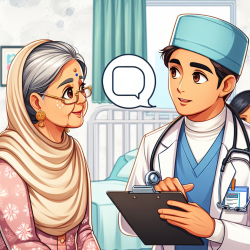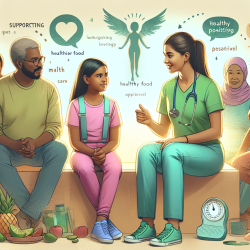Introduction
In the field of pediatric healthcare, understanding conditions that require prompt attention is crucial for speech-language pathologists and other healthcare providers. One such condition is epiglottitis, a potentially life-threatening inflammation of the epiglottis. This blog post explores the findings from the research article titled "Otorhinolaryngology" and how they can be applied to improve outcomes for children with epiglottitis.
What is Epiglottitis?
Epiglottitis, also known as supraglottitis, is an inflammation of the epiglottis and surrounding tissues, primarily caused by bacterial infections. It is most common in children aged 2 to 7 years but can affect individuals of any age. The condition is characterized by a rapid onset of symptoms, including sore throat, high fever, and difficulty swallowing. A muffled voice, drooling, and respiratory distress are also common signs.
Key Findings from the Research
The research article "Otorhinolaryngology" highlights several critical aspects of epiglottitis:
- Signs and Symptoms: Rapidly developing sore throat, high fever, restlessness, lethargy, and a characteristic "supraglottic" voice.
- Diagnosis: A high index of suspicion is necessary, especially when oropharyngeal findings do not match the severity of symptoms. A lateral neck radiograph showing a "thumbprint" sign can be diagnostic.
- Management: Immediate airway management is crucial. Antibiotics such as cefotaxime or ceftriaxone are recommended, and steroids may help reduce inflammation.
- Prevention: The incidence of epiglottitis has decreased since the introduction of the Haemophilus influenzae type b (Hib) vaccine.
Implementing Research Findings in Practice
For speech-language pathologists and other practitioners working with children, the following strategies can be implemented based on the research findings:
- Early Recognition: Train caregivers and educators to recognize early signs of epiglottitis, such as difficulty swallowing and changes in voice, to ensure prompt medical evaluation.
- Collaboration with Healthcare Providers: Work closely with pediatricians and ENT specialists to ensure a coordinated approach to managing suspected cases of epiglottitis.
- Education on Vaccination: Advocate for vaccination against Hib as a preventive measure to reduce the incidence of epiglottitis.
- Data-Driven Decision Making: Use data from clinical assessments and research to inform treatment plans and monitor outcomes for children with a history of epiglottitis.
Conclusion
Epiglottitis is a serious condition that requires immediate attention and appropriate management. By understanding the research findings and implementing evidence-based strategies, practitioners can improve outcomes for children affected by this condition. For more detailed information, you can access the original research paper on Otorhinolaryngology.










